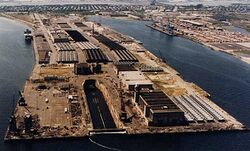Tagosi Crisis
 Former Traditionalist leader Perianus Birus Sinon defending his government at the official inquiry | |
| Date | June - July 1995 |
|---|---|
| Location | Amalfi |
| Cause | Political corruption and colonial equality debate |
| Convictions | 5 |
 |
|---|
| This article is part of a series on the politics and government of Amalfi |
The Tagosi Crisis was a diplomatic crisis and political scandal in mid-1995 that led to the collapse of the Government of Amalfi and the ruling Traditionalist Party. The crisis began after it emerged that government ministries had authorised the construction of a major naval base in the Amalfitan colony of Tagosi, despite the Admiralty's recommendation that the ideal location for the base was the colony of Kaalia and despite the Supreme Court's insistence that authorisation had to come from the Senate.
News of the scandal first broke in June, when the Concilium Revarii, the local authority in whose jurisdiction the new base was located, denied the Department of Military Finance planning permission for wharves and piers, demanding to see evidence of Senatorial approval. A journalist from a local newspaper reported on the denial and the story was quickly picked up by national media. The scandal raised concerns over the extent of corruption within the government and the status of Amalfi's colonies under Conformitas Imperiala. Eventually, fifty eight Traditionalist senators announced their resignation from the party and a further eleven immediately resigned from the Senate altogether. The opposition successfully passed a motion of no confidence and the government collapsed.
Background
In 1990, the Admiralty of Amalfi released a report stating that the diplomatic credibility of Amalfi and its role in promoting regional stability depended almost entirely on its ability to maintain a strong navy. The report criticised the excessive centralisation of its naval bases in metropolitan Amalfi and recommended a new base be developed in the district of Parmasu, in Kaalia. The following year, the Senate debated the recommendations of the report before approving funds for the new base, though the specific location was yet to be decided.
Local authorities in Amalfi often bid for contracts to host military facilities because of the additional budget they allow. In all cases, the bid, and subsequent planning permission application, must first be approved by the Senate before construction begins. Because the original report had specified a location for the base, bidding did not take place and so the plans were never publicised. In late 1993, construction began on naval facilities near the town of Matritu, in the district of Revarium, Tagosi, authorised by the Department of Military Finance. It was not until 1995, when the department approached Revarium's council looking for additional, retroactive planning permission, this time for wharf facilities, that the council discovered that the initial plans proposed did not have Senatorial approval, and the council rejected the application.
Revelation
Media response
The first newspaper to report was the Tempores Matritua, whose government correspondent had been sitting in on council sessions in order "to fill [his] page". The story was put onto the paper's front page on 3 June and was quickly picked up by the Tagosian Herald and its national ownership. Within 48 hours, the story of the denied application was on the front pages of almost all of Amalfi's national papers, with the Republic Examiner's writer being the first to note that the original proposal had been for Kaalia, not Tagosi.
Government response
Opposition parties in the Senate reacted quickly to the news when it returned to session on the Monday, demanding that the Ministers of Finance and Defence account for their failure to seek Senatorial approval. Senator Junus Avulus Gerax, from the Republican Party, insisted that governmental authority had been undermined, and proceeded to filibuster the debate for the next three hours until he suddenly fainted from lack of oxygen. Other representatives insisted that the colonies' rights had been violated, but no one was able to determine if this was, in fact, the case. Whether the historic policies of Conformitas Imperiala had, in fact, achieved political equality between colonies and metropole suddenly became a divisive question in the governing Traditionalist Party, and by Thursday over a dozen of its members had resigned from the party. On Friday, 9 June, Beraius Addarus Erenzi, leader of Forzia Socialistica, accused government ministers of corruption and claimed to possess evidence of bribes taken.
International reactions
- The government of Mishmahig interpreted the naval base as a hostile gesture and an attempt to destabilise regional relations. It denounced the actions of the Amalfitan government and sent its navy out on exercises.
- The government of Breheim sat back and laughed.
- Agricourt's government released a statement urging "local powers [Amalfi] to halt the construction of the naval base deemed as 'threatening the open interests and integrity of countries in northwest Nocturnalya'".
 Kylarnatia: The Department for Foreign and Imperial Affairs condemned the level of corruption in Amalfi's government, and suggested that more checks should be put in place to prevent future mishaps and potential threats to their colonial integrity.
Kylarnatia: The Department for Foreign and Imperial Affairs condemned the level of corruption in Amalfi's government, and suggested that more checks should be put in place to prevent future mishaps and potential threats to their colonial integrity.
Resignations
In total, seventy nine senators from the Traditionalist Party resigned. Fifty four went on to form the Libertarian Party, while two joined the Republican Party and two became independents. Eleven resigned from the Senate immediately and the remaining ten announced they would not be standing for reelection. Six more senators resigned in protest; four from the Republican Party, one from Forzia Socialistica and one from the Democratic Party. The leader of the Traditionalist Party, Perianus Birus Sinon, also resigned his position on 10 July but retained his seat in the Senate.
Aftermath
Inquest
A formal inquiry into bribery and corruption was launched in November 1995. The Ministry of Military Finance was found guilty on several charges of bribery and corruption and fined heavily. The tribunal made its first conviction in 2004, of resigned senator Marnus Pallius Ixvi, and convicted a former junior minister in 2006. Three further convictions have been made to date.
Parties
With a quarter of the Traditionalists' sitting senators having resigned, the party was forced to negotiate a coalition with the largest opposition party, the Republican Party.
The overwhelming majority of the resigned Traditionalists established a new party, the Libertarian Party, under the leadership of senator Gaiena Aquidora Roterni. It went on to become the largest opposition party in the 1995 general election and to hold that position.
The scandal brought the question of colonies' rights to the forefront of Amalfitan politics, and the Society for Liberty saw substantial growth in the immediate aftermath. It went from being the fourth largest opposition party, behind the Republicans, Diarchists and Socialists, to the second largest after the next election.

